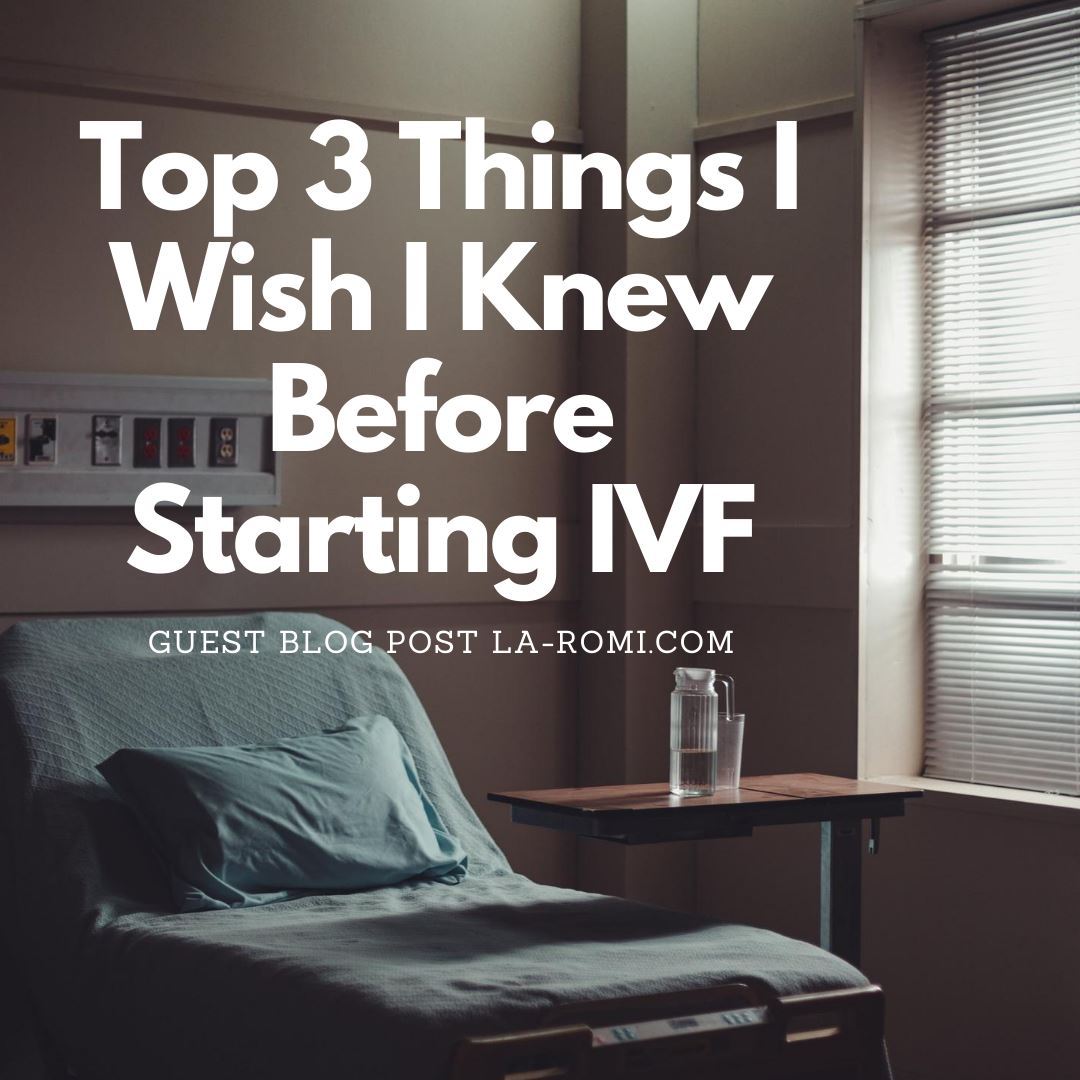Artikel: Top 3 Things I Wish I Knew About IVF

Top 3 Things I Wish I Knew About IVF
Guest Blog Post by @ajourneywithjacob and if you have something you want to share then do get in touch to guest blog on La-Romi.com.
---------
When my husband proposed in December 2015 it didn’t take long before the subject moved from weddings to babies.
We’d been together nearly eight years by this point, so it was something we had discussed before, but now, this was getting serious. The conversation had changed from ‘yes we’d like children in the future, what shall we name them?’ to ‘let’s start trying for a baby in the few months before our wedding.’ I know, smart decision right? Who doesn’t want to be hormonal, bloated and needing to pee every 10 minutes whilst in a wedding dress?
So when our big day came and went in April 2017 and we hadn’t fallen pregnant, a small part of me already knew that this wasn’t going to be an easy road. I’m not sure why, because I know on average it takes a healthy couple six months to fall pregnant, and we hadn’t yet reached that point.
But there was something niggling away at me, something that told me that this was not going to be as straightforward as two people fall in love, get married and have 2.4 children. Like many women, I love to be right, how I wish I wasn’t on this occasion.
Fast forward to February 2019, we had been trying for a baby for over two years. I had taken every combination of tablets going, I’d had my fair share of cameras shoved inside of me (little did I know how many more were to come) and a very painful procedure to check my tubes weren’t blocked. By this point we started to lose hope, until we got our approval through to start IVF.
I had thought about IVF a lot over the years, yet I’d never really researched it, because deep down, I thought that by simply looking into it, it would mean we had given up.
What it actually meant was that we were fighting. Fighting to be parents, fighting to have a basic human right, fighting for hope.
Now if you’ve come across my instagram page before (@ajourneywithjacob), you’ll know that we went on to have our baby boy Jacob who was born in the middle of lockdown in March 2020. So having been through a successful round of IVF, here are the top three things I wish I had known before starting the process;
It doesn’t always work the first time.
And success rates can be misleading.
Yep, you read that right. When you think IVF, you think baby. Sadly that isn’t always the case.
In reality, only 18% of couples are successful on their first round of fertility treatment. This can be a hard pill to swallow. After all, the average IVF cycle costs £5000. If someone told you to bet £5000 on a race and you only had an 18% chance of winning, it’s highly unlikely that you’d do it.
But that’s what thousands of couples are prepared to do because, if you’re lucky, you might just fall into the 18%.
We were presented with a list of different clinics and their success rates. Simple, right? You just pick the one with the best success rate. What those figures don’t tell you is just how long it took for the cycle to work or if those pregnancies resulted in live births.
For example one of the clinics we looked into boasted a 49% success rate on their website, but when the NHS helped us look closer, the rate actually fell to below 10% for a first time success with a live birth at the end.
To learn more about fertility rates in your local clinics, I recommend visiting https://www.hfea.gov.uk/choose-a-clinic - the HFEA standardises everything to allow you to accurately compare all clinics.
IVF cycles can take a really long time
And birth control is important
Once we had been given the go ahead, I had visions that we’d be implanting a little embryo back in after a few weeks. What no-body had told me was that the average IVF cycle takes 6-8 weeks from consultation to transfer. And what’s more, I had to go back on birth control before we could even think about injections, follicles and babies.
Birth control is used to regulate your cycle, this allows the clinic to accurately time when you’ll start stims (stimulation) and therefore when your follicles are likely to be ready for collection. I found this one a little difficult to get past at first, after all, I had spent the best part of a year getting the pill out of my system.
In the end, our first (and thankfully, only) cycle ended up taking roughly seven weeks from start to finish as my body wasn’t responding as quickly as it should to the medication so doses were increased and the number of injection days were upped.
If I can give you one piece of advice, it would be to not focus too heavily on the dates initially suggested, I spent many a day crying my eyes out to the clinic as my procedure kept being postponed and I was sure that meant it was going to fail.
It’s OK not to talk about it
It’s also OK to talk about it with everyone
As soon as we were married, the same question kept cropping up, from colleagues at work to people in the supermarket, and at one point, my mum’s 80 year old neighbour;
“When are you going to have a baby?”
At first I would say “Who knows, soon hopefully.”
Then it quickly turned to silence, I would shut myself off and change the question. Eventually I just got annoyed and on more than one occasion retaliated with the following;
“I don’t know, maybe never, until then I suggest you stop asking me.”
“On the 15th June 2019 at 21:00, does that work for you?”
What I’m saying is, it’s OK not to talk about it with people that you don’t want to talk about it with. It took me a long time to work out the balancing act with this one. To start with, I spoke to no-one except my husband, but I quickly realised that we were both struggling to cope with that.
Next, I decided to speak to anyone that asked me a question. That was too much for me as it was the constant topic of conversation and it nearly always meant that I didn’t get a break from constant questions.
Finally I decided that the best thing for me was to be open with a few very close friends and family. It benefitted my mental health more than I could have expected as it helped me to vocalise fears that were twisting and turning in my head.
So if you want to talk to everyone, that’s great, likewise if you only want to speak with a few close friends, that’s fine too. Whatever works best for you. Infertility can be a lonely place, so whilst it may be incredibly difficult for you to talk about, I would recommend talking to at least one person in addition to your significant other, it takes a village after all.
If you’d like to follow my journey, please find me over on instagram @ajourneywithjacob
Helpful resources:


Hinterlasse einen Kommentar
Diese Website ist durch hCaptcha geschützt und es gelten die allgemeinen Geschäftsbedingungen und Datenschutzbestimmungen von hCaptcha.